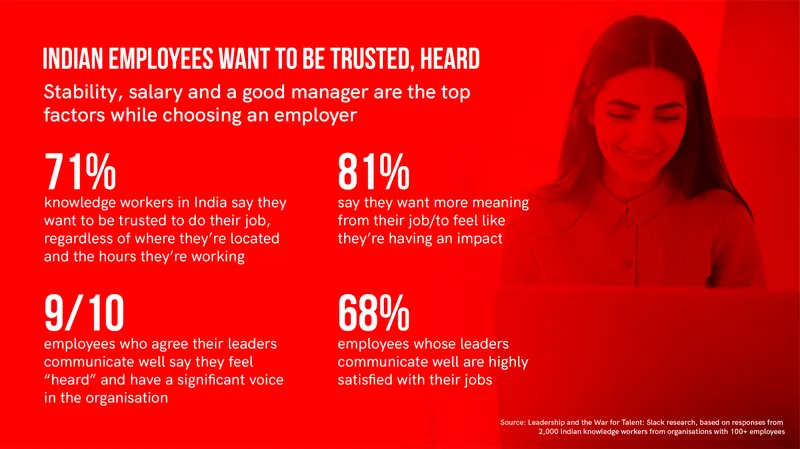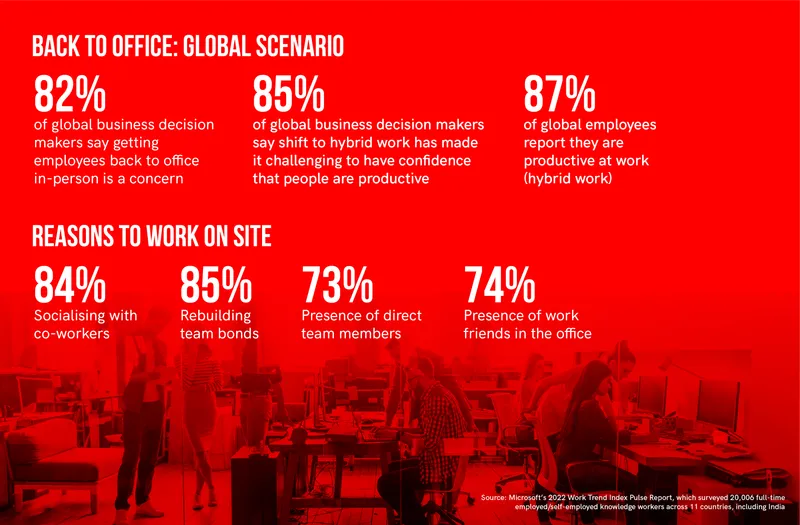Back-to-office mandate evokes mixed response, firms may have to embrace fluid work models
To ensure a successful return to office, organisations should support the needs of today’s diverse workforce with a hybrid work model. Employees too need to understand that working from home may not be a long-term solution for career progression, say experts.
For millions of people around the world, COVID-19 changed a lot of things in the way they worked, forcing them to quickly adapt themselves to a remote working life. Now, more than two years later, they are faced with yet another situation that requires them to readapt themselves. It’s not something they are unfamiliar with, but after two years of working from home, employees are feeling a bit disconnected from the idea of working in an office.
As COVID-19 recedes, several companies have indicated that they want their employees to return to office. While some companies such as IT major TCS have taken a more direct approach, mandating employees to return to office for a certain number of days in a week, others such as Infosys and some small firms have taken a flexible approach, wherein employees can come to office when they want to.
Regardless of the approach, the signal from the companies is abundantly clear—it’s time to move out of the comfort zone and get back to the office environment.
What employees feel
When COVID-19 reared its head in early 2020, it wasn’t easy for all employees to slide into the work-from-home setup. Some of them found it difficult initially to get used to the idea of turning their house into a workspace.
However, with time, they accepted the change and began enjoying the benefits of remote working—no commute, the option to work from anywhere, work-life balance, and more time for one’s hobbies. Remote working also helped many employees realise improved productivity.
As a result, the decision to get employees back to the office has been met with lukewarm response, with employees expressing mixed reactions. The pervading sense is that many employees want a flexible work culture without strict conditionality.
YourStory spoke to a few employees on what they think about getting back to office.
Anuradha, a senior software professional at a leading IT company, says companies are following a “copycat culture”, wherein they are pushing their employees to return to office as they see other companies doing so and feel the need to follow suit.
She reasons, “If companies managed to get all the work done over the last two years and their businesses flourished even with employees working from home, I don’t understand why they cannot continue to do so now.”
This sentiment is echoed by several employees whom YourStory spoke to.
Radhika, a software professional at a leading IT company, says, “For people who moved to their hometown during the pandemic and have been working from those places, it is an inconvenience to come to office for two to three days a week as they would be required to move back to the city where their office is located. Unless the job role requires them to work from office for a certain number of days, they should not be forced to return to office and be allowed to work remotely.”
However, Rohit, who works at a consulting firm, has accepted the new reality. He says, “It was a big change to go back to office after two years. But working from an office desk, chatting with colleagues sitting at the adjacent tables, and listening to the chatter and the buzz coming from common areas were things that I didn’t realise I missed. After a few days, things felt normal at work.”

Illustration credit: Nihar Apte
Opinion is divided
According to a Slack research report, based on responses from 2,000 Indian knowledge workers from organisations with 100+ employees, 54% of Indian employees across industries prefer working entirely on-site.
When asked about the impact of working from home, 83% of employees in the government and defence sector and more than three-fourth of the employees in the BFSI, IT and communications sectors expressed that working from home enables them to have a greater voice in the organisation, as they can share their ideas and thoughts more openly.
According to this report, 71% of knowledge workers in India say they wanted to be trusted to do their job, regardless of where they’re located and the hours they’re working.
Employers’ concerns
In the post-pandemic world, organisations and leaders are now faced with the challenge of ensuring employee productivity, common company culture and connect, and cross-fertilisation of ideas, leading to innovations. These can’t be achieved if there isn’t an environment where everybody comes together and brainstorms, says Harold D’Souza, Co-founder and Director, WalkWater Talent Advisors, a leadership search and talent advisory firm.
Sudhakar Balakrishnan, Group Chief Executive Officer, FirstMeridian Business Services Limited, a Bengaluru-based staffing company, believes it is important for companies to imbibe their distinct company culture and value system in their employees. He also says working together is good for team bonding and developing trust. “You start trusting your colleague, you start sharing information. The organisation culture evolves because of trust, which is a very important factor in a company.”
Some companies are afflicted by ‘productivity paranoia’—wherein there is a stark disparity between how much people say they are working and how much leaders think they are working.
According to Microsoft’s 2022 Work Trend Index Pulse Report, which surveyed 20,006 full-time employed or self-employed knowledge workers across 11 countries, including India, 87% of global employees report that they are productive both at home and at office. However, 85% of leaders say that the shift to hybrid work has made it challenging for them to have confidence that their employees are being productive.
Long-term career prospects
In the long run, working from home is not a solution for career progression, caution experts.
Harold says that professionals at all levels need to understand that working from home is not a long-term, healthy solution for career growth and it won’t help them learn the nuances of any job.
“While hybrid working is the way forward, professionals need to understand that if they need to move ahead in their career, they need to come back to office and have some flexibility, of course. But they cannot be in Goa or Uttarakhand anymore to work for a company in Bengaluru,” he says.
Gaurav Munjal, Co-founder and CEO of Unacademy, recently said in a tweet, “The first piece of advice I give every early-stage founder I meet is to ban remote work in their org and call everyone back to office (except for genuine cases)… In almost every case I get a message a few weeks later saying that this advice was game-changing for their org.”

Need to look beyond policy
According to the Microsoft work trends report, 82% of business decision-makers say getting employees back to the office in person is a concern in the coming year. But policy alone will not reverse the on-ground reality. Around 73% of employees and 78% of business decision-makers say they need a better reason to go in to office than to just meet company expectations.
The report reveals that connecting with colleagues is a key motivation for working in person. 84% of employees would be motivated by the promise of socialising with co-workers, while 85% would be motivated by rebuilding team bonds. Employees also said that they would go to the office more frequently if they knew their direct team members would be there (73%) or if their work friends were there (74%).
Drawing employees to office
Different companies are doing different things to draw employees back to the office.
HR teams are increasing the engagement with employees with more employee-connect programmes, town hall meets, and get-togethers. Firms are also organising a lot of in-house training so that people see the benefits of coming back to office. Some companies are also trying to lure employees with food coupons and a wide range of food choices and upping the quality of food at the office cafeteria.
In some firms, project heads and managers are under immense pressure to get their teams on site. Sagarika (name changed), says that the internal team leads and project managers, at the IT company she works in, are propelling the work-from-office drive, as they are under pressure from the higher management to get a certain percentage of employees to work from the office. Dashboards have been built to track the work-from-office targets, she says.
Trainees are being asked to come to office so that they can learn and grow with support from others. However, mid-level employees are not coming to office, Sagarika notes. Some of them are even threatening to resign, making the job of their managers difficult. Senior employees, above a certain level, have been forced to come to office, she adds.
Will a salary increase help employees return to the workplace full-time? According to a survey done in the US by Eden, an HR and workplace software provider, 64% of tech employees who work remotely full or part-time say it would take more than a 20% pay increase to get them to work in office five days a week.

Illustration credit: Nihar Apte
Bridging the disconnect
Whether companies use a carrot or a stick or a bit of both, the truth is the work environment can become uncomfortable if employers and employees do not see eye to eye on the need to return to office.
The Slack study found that 61% of knowledge workers say their leaders are “stuck in their ways of working” and 47% say there is a “disconnect” between senior leaders and employees.
Disconnect between leaders and employees can result in a rise in attrition. Forcing employees who demand work flexibility to return to office could drive them to look for alternative job prospects where flexibility is offered.
According to a meQuilibrium survey, employers need to understand the factors behind people’s reluctance to return to office. For instance, remote and hybrid employees tend to have a higher degree of ‘psychological safety’ at work than on-site employees.
Psychological safety is an environment that encourages, recognises and rewards individuals for their contributions and ideas by making individuals feel safe when taking interpersonal risks.
“There is a real difference in psychological safety among work settings. In many remote-for-the-first-time environments, where everybody is the same size square on the video call, it’s often easier to speak up and be heard,” says Brad Smith, Chief Science Officer, meQuilibrium.
Brad elaborates, “As employers continue to consider how best to structure the workplace, leaders will need to address this very real gap in psychological safety across work settings in order to ensure that innovation, creativity and change-readiness are not compromised in the return to on-site work.”
Organisations can make the workplace motivating for employees to have meaningful connections with colleagues through constant employee engagement and by creating an environment that’s open to ideas, innovation and sharing. Harold of WalkWater Talent Advisors says this engagement could be in the form of events that get people together for innovation and idea challenges and competitions that encourage sharing and teamwork.
Embracing a flexible future
To ensure a successful return to office, companies need to embrace the needs of today’s diverse workforce. Organisations should focus on offering equitable work experiences for all employees, giving them the necessary tech-based collaboration solutions, appropriate workspaces to perform tasks, and tools that suit individual workstyles.
While fewer work days and work hours—which countries like UK, Belgium and Iceland are experimenting with—may be a distant dream in a country like India, it is important for organisations to offer their employees flexibility at the workplace.
Just like employees need to understand the importance of working on-site, employers too need to offer a flexible work culture for employees with a hybrid model, say, experts.
“Technology has changed and enabled different ways of working. We didn’t have it earlier. The technology we have at our fingertips today has enabled us to look at work differently and has encouraged flexibility in working. Also, the various kinds of work we do today don’t necessarily need rigidities and set structures around timings etc.,” explains Harold.
Fluidity is the future of enterprises and rigidity has no place in it. This means traditional workplace practices have to give way to a flexible work culture, which takes into account the needs of both the organisation and its employees.
Edited by Swetha Kannan







